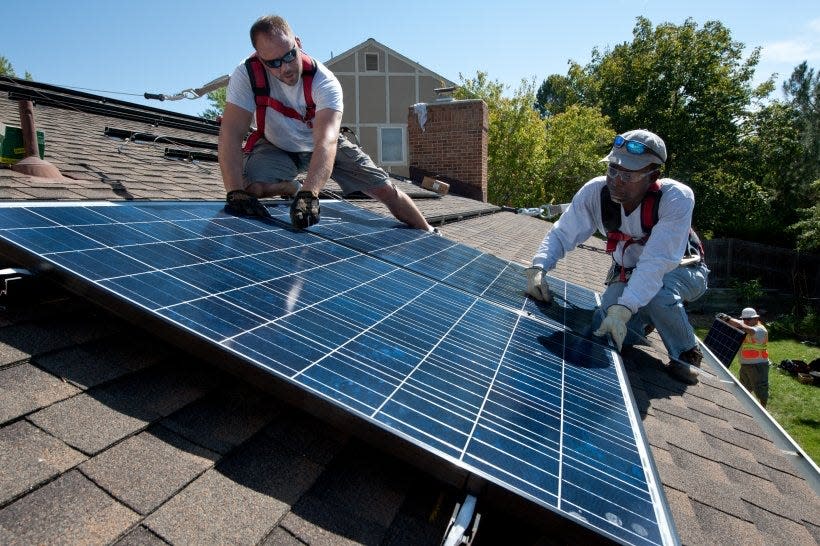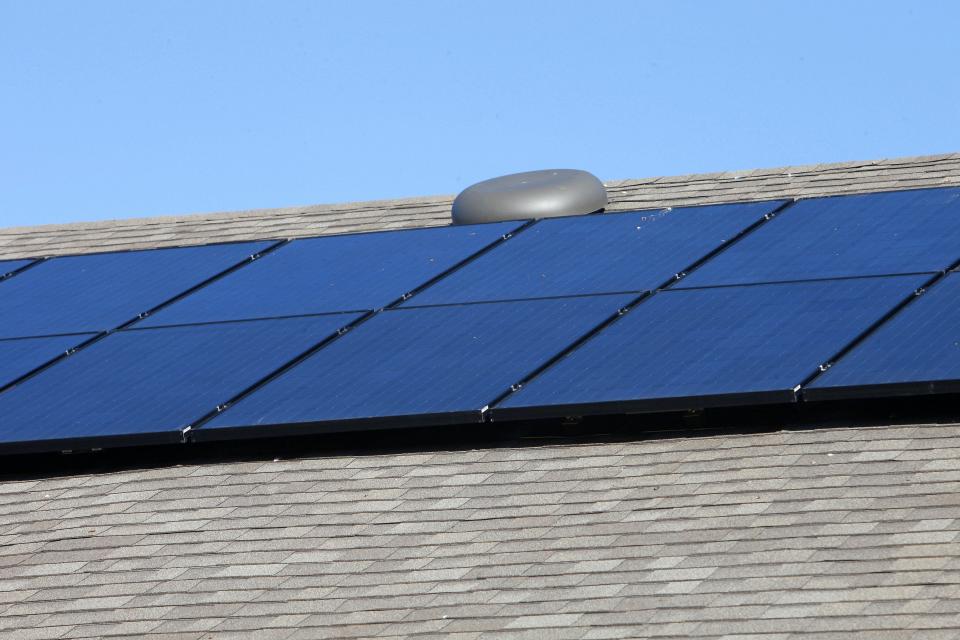Clean energy advocates appeal new NC rules that cut payments to rooftop solar owners

Worried that the outlook for the continued rapid growth of residential solar power in North Carolina could start being eclipsed, several environment groups have asked the N.C. Court of Appeals to overturn Duke Energy's new rates and rules for rooftop solar panels.
The new rules, which came into force Oct. 1, reduce what residents can get paid by the utility for excess power their panels generate and that's returned to the power grid, a billing arrangement called net metering. The regulations also add a new $10 monthly rooftop solar fee to residents' bills.
Duke says the changes are needed to level the playing field between rooftop solar customers and the utility giant's other customers. In short, the company said customers without solar were subsidizing those who had installed the rooftop panels under the old rules that had been in place since 2000.
“Duke Energy feels confident that our work with stakeholders and evaluation by the N.C. Utilities Commission has resulted in a sustainable future for net metering − one that treats solar and non-solar customers fairly," said Duke spokesman Randy Wheeless.
Duke isn't alone in pushing to change the status quo when it comes to residential solar. Utilities across the country, notably in California, claim the generous rates and benefits offered solar customers aren't sustainable and that those with rooftop solar systems aren't paying their fair share to maintain the transmission grid and support the maintenance of existing plants and the construction of new energy sources.
THROWING SHADE With recent setbacks, is North Carolina's solar power industry cooling off?
Who should do the study?
Earlier this year the utilities commission, which regulates Duke's residential power operations in the state, rejected arguments by environmentalists and N.C. Attorney General Josh Stein's office that an independent cost-benefit study should be required, instead agreeing with Duke that the utility's financial analysis was adequate.
State House Bill 589, passed in 2017, required a cost-benefit analysis into customer-sited power generation. But the sticking point was who should do the study. Opponents of Duke's new solar rules and regulations say just relying on the utility's study doesn't take into account all the benefits of increasing the amount of solar power supplying the grid.
“The state law requiring the commission to conduct a comprehensive cost-benefit analysis is crystal clear, yet regulators have flagrantly ignored it,” said Carolina Leary, general counsel for the Environmental Working Group, one of the groups challenging the utilities commission's order in court. “By reducing these financial incentives, the commission is effectively discouraging homeowners from installing rooftop solar, which will stymie the state's efforts to reduce CO2 emissions and address the climate crisis.”

Environmentalists say the new rules make rooftop panels less attractive by raising costs and increasing the time it takes to pay off solar investments, with some activists fearing costs could balloon more than 30%. According to a report released in October 2022 by Environment America Research & Policy Center and the Frontier Group, North Carolina ranked fourth in the nation for the growth of solar generation between 2012 and 2021.
North Carolina Gov. Roy Cooper, a Democrat, has made aggressively reducing the state's carbon footprint, largely by reducing greenhouse gas emissions from the energy and transportation sectors, one of the focal points of his administration. But the moves to push North Carolina's economy and consumers to embrace cleaner energy sources, such as renewable energy and electric vehicles, has run into concerns from some Republicans and business leaders that the government could sacrifice affordability, reliability and economic growth in a rush to reduce emissions.
Environmentalists and clean energy advocates have responded that we're running out of time to reduce the heat-trapping gasses humans keep pumping into the atmosphere in ever-increasing numbers and affordable and long-term clean energy options are often being ignored or soft-pedaled to protect special interests.
According to the U.S. Energy Information Administration, North Carolina's power generation mix − for decades dominated by coal-fired plants − in the first quarter of 2023 was roughly 2.16 gigawatts (GW) from coal, 2.23 GW from solar, 9.4 GW from nuclear, and 13.4 GW from natural gas.
SHINING BRIGHT With coal losing steam, solar is filling the NC power void. But natural gas is still king.
The utilities commission order approving Duke's new rules lets current solar customers keep their current rates until January 2027. For new customers, monthly credits for electricity sent to the grid would be lower and would vary according to time of day and electricity demand.
Wheeless, the Duke spokesman, said the utility has about 43,000 net-metering residential solar customers in North Carolina, up from around 6,000 in 2017 when the company began a $50 million solar rebate program that just wrapped up.
Reporter Gareth McGrath can be reached at GMcGrath@Gannett.com or @GarethMcGrathSN on Twitter. This story was produced with financial support from 1Earth Fund and the Prentice Foundation. The USA TODAY Network maintains full editorial control of the work.
This article originally appeared on Wilmington StarNews: Why rooftop solar for NC homeowners just got more expensive

